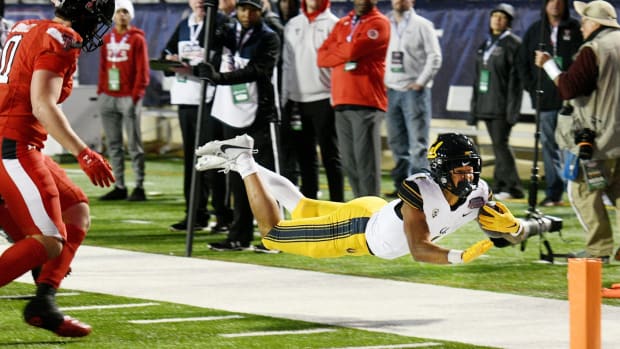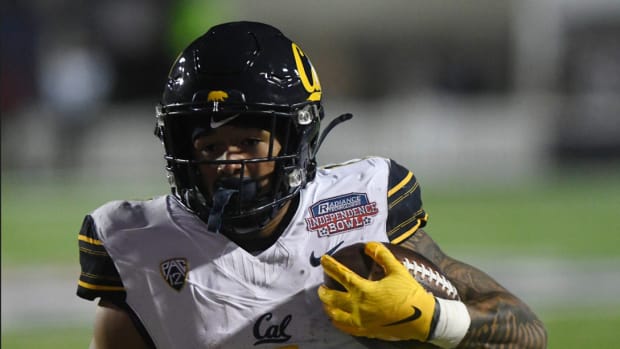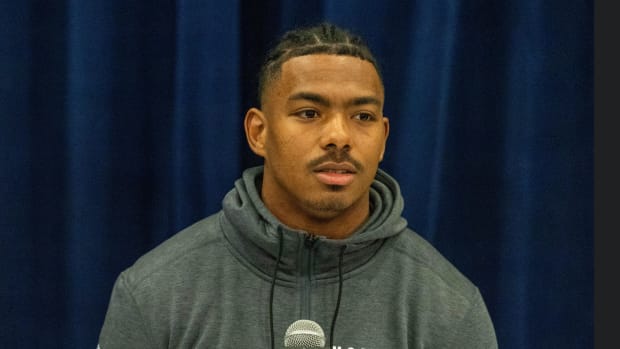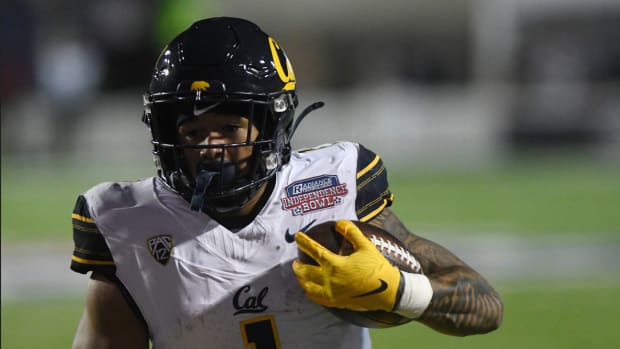Cal Football: Even in a COVID World, Athletic Trainers Are Up Close and Personal
It’s tempting in the year 2020 to conclude there is little reason to feel grateful on this traditional American day of thanks.
But when the Cal football team returns to Memorial Stadium on Friday afternoon for its first home game in 377 days — the Big Game, no less — coach Justin Wilcox will be among those feeling a special kind of thankful.
Yes, the Bears’ season has seemed at times like a runaway train ready to come off the rails — much like 2020 itself. There have been too many stops and starts to count, but a team within the team that has helped make sure the Bears are able to carry on.
Cal’s football training staff, led by Brenden Lambert, has researched, strategized, planned, adjusted and readjusted throughout the pandemic in a piece of the program’s big-picture equation we rarely see. For a college football team, they are the ultimate essential workers.
Some of what they do to keep Cal’s players healthy involves activity the rest of us have been repeatedly warned against for more than eight months — breaking the recommended social-distance barrier of six feet.
“They’re up close and personal, whether it’s taping ankles or providing care in treatment or even on the field at times,” Wilcox said. “Our trainers have done a great job with that. They’re right in the middle of this in helping us understand what we need to be doing. They’re critical to our success as well.
“I think we all — players, coaches, everybody — appreciate the people that are making this happen.”
This was new ground for Lambert and his football training team of Katie Hughes, Kristy Illg, Kevin Shubow, and Jerry Lin. He jokes about how all the schooling he had for this job never had a chapter that covered COVID-19.
I interviewed Lambert on Zoom prior to Cal’s scheduled opening game against Washington. That game, of course, never happened and in the swirl of change that has followed this story never got written.
But I touched base with Lambert this week to check on whether things have changed in the interim, especially given that the Bears have had two players test positive, forcing two separate groups into quarantine.
Lambert said nothing has really changed, including the systems and procedures they put in place to contend with the virus. But also including his impressions of how Cal’s players have responded to all the change in their world.
“I still am very impressed by the players,” Lambert said. “Even met with adversity, they continue to do their best to mitigate the spread by following the policies and procedures we've put in place, knowing that those safeguards are allowing us to continue practicing and playing even if we end up having a few individuals quarantined at a given time.”
These videos were recorded several weeks ago so keep in mind there are a couple references that seem dated. I’m sharing them because they offer insight to the work Lambert and his team have done to help allow the Bears to play this season.
In the initial video, Lambert discusses the work the Cal medical and training staffs did last spring, before they were even allowed back on campus, so they’d be ready to go when they got the green light.
Toward the end of the video Lambert acknowledges he and his staff have felt anxiety at times throughout this long slog.
“I would lie to say there wasn’t. But honestly, our staff was champing at the bit. We were excited to get back and help these guys see what this new world was going to look like,” Lambert said. “We knew they would not necessarily struggle, but just be maybe frustrated by it at first because it didn’t look the same. It wasn’t what they were used to.
“But our staff was excited for that challenge. So I would say, yeah, I little bit of hesitation in the sense that, `I hope this works,’ but also, `We’re going to do everything we can to make it work.’ So it’s been really good and a positive kind of transition.”
In this second segment, Lambert addresses the level of responsibility he has seen in Cal’s players.
“I think they’ve done an awesome job,” he said. “We’re all asking the entire world to do something that we’re not used to. And 18-to-22-year-olds are probably the hardest population to help them understand that.”
Their motivation to function properly comes through on a regular basis and has its roots in their desire to be on the field, Lambert said.
“Playing is a really big incentive.”
In this next part of our interview, Lambert talks about the hardest part of his job — keeping players who are injured or ill in a positive frame of mind. That has been more challenging still in the era of COVID,
And he addresses the fear factor that most people have experienced at some point during the pandemic.
“Absolutely. I think there was a little bit of that,” he said. “I think everyone felt that, even us as staff. Because some of us are going back to families, some of us are going back to sharing apartments with non-athletics personnel.
"Just because of the unknown, there is a little sense of fear. What if I get it? What’s that going to do to me? Even if I don’t have symptoms, will I give it to somebody else?
“That’s been the driving force of our messaging. Even though you might not get sick, you might give it to somebody else who might get sick. And that’s a really hard thing to wrap your mind around.”
Finally, Lambert walks us through what his team does on game day, which involves arriving at the stadium before pretty much anyone else.
Getting to game day healthy and able to play is, of course, the primary objective.
“In game, it will hopefully feel like it normally does. They’ve all tested negative. They get between the lines and it’s back to football,” Lambert said. “Outside of football everything is so weird and different, but (football) is where they get to feel normal.”






